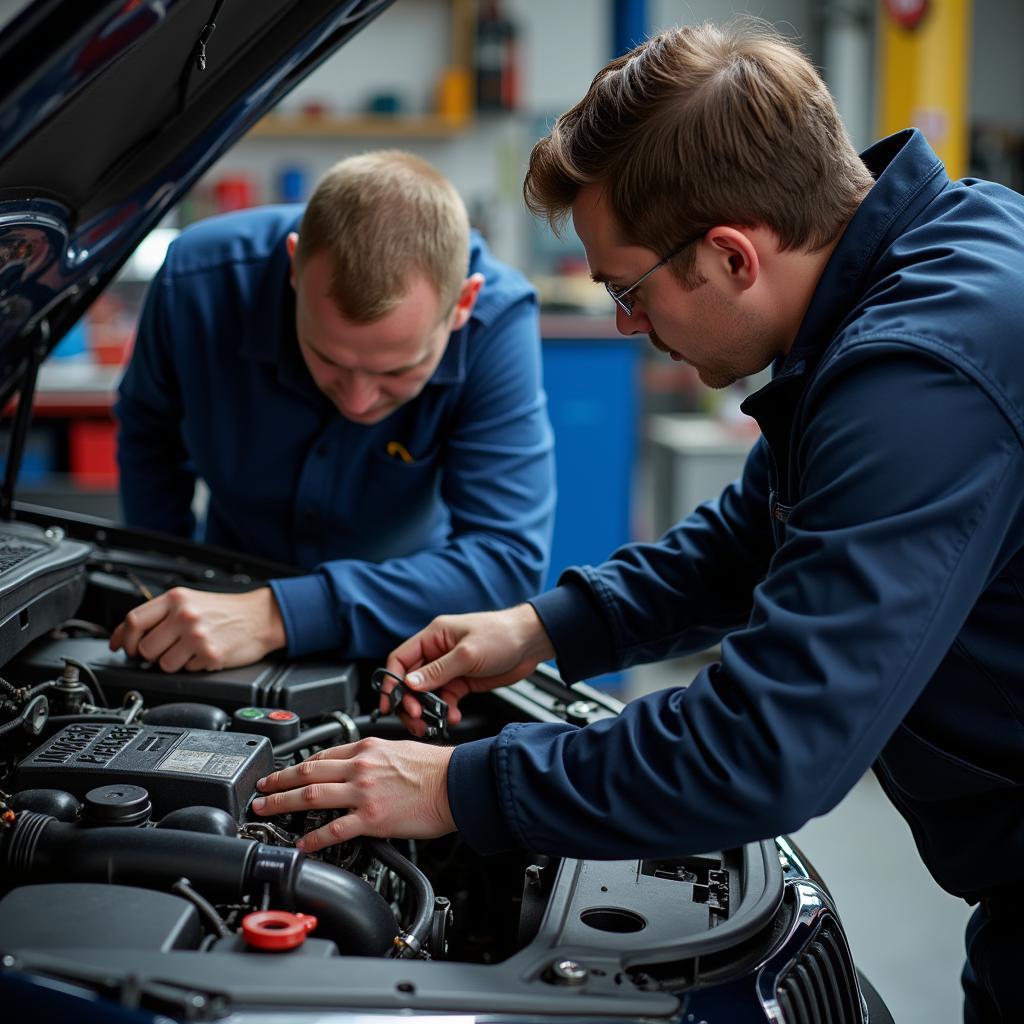Diagnosing Car Ignition Problems can be tricky, but understanding the system and following a logical process can save you time and money. This guide will equip you with the knowledge to troubleshoot common ignition issues and get your car back on the road.
Understanding the Car Ignition System
The ignition system is the heart of your engine, responsible for igniting the air-fuel mixture that powers your vehicle. A faulty ignition system can lead to a variety of problems, from a simple misfire to a complete no-start. Key components include the battery, ignition switch, ignition coil, distributor (in older vehicles), spark plugs, and related wiring. Each plays a crucial role, and a problem with any one can cause ignition problems. For more information on car starting problems, check out common car start problems.
Common Symptoms of Ignition Problems
Identifying the symptoms is the first step in diagnosing car ignition problems. Common symptoms include:
- Difficulty starting: The engine cranks but doesn’t start, or takes longer than usual to fire up.
- Misfiring: The engine sputters, hesitates, or lacks power, especially under acceleration.
- Rough idling: The engine vibrates excessively or runs unevenly at idle.
- Reduced fuel economy: A misfiring engine burns more fuel than necessary.
- Engine stalling: The engine shuts off unexpectedly.
Diagnosing Car Ignition Problems: A Step-by-Step Guide
Checking the Battery
A weak or dead battery is a common cause of no-start situations. Use a multimeter to check the battery voltage. A reading of 12.6 volts or higher indicates a healthy battery. If the voltage is low, try jump-starting the car. If the car starts, the battery may need replacing or charging.
Inspecting the Ignition Switch
The ignition switch delivers power to the ignition system. A faulty switch can prevent the car from starting. Test the switch with a multimeter or by attempting to start the car in different key positions. You may experience intermittent issues like those discussed in our article on intermittent car starter problems.
Testing the Ignition Coil
The ignition coil transforms the battery’s low voltage into the high voltage needed to fire the spark plugs. A faulty coil can cause misfires or a no-start condition. Use a multimeter to test the coil’s primary and secondary resistance. Compare your readings to the manufacturer’s specifications.
Examining the Spark Plugs
Spark plugs ignite the air-fuel mixture in the engine cylinders. Worn, fouled, or damaged spark plugs can lead to misfires, rough idling, and poor fuel economy. Remove the spark plugs and inspect them for signs of wear, such as excessive gap, carbon buildup, or damage. Replace worn or damaged spark plugs. For those experiencing common car start problems, it might be a good starting point to inspect your spark plugs as mentioned in the article on typical car starting problems.
Checking the Distributor (Older Vehicles)
Older vehicles with distributor-based ignition systems may experience problems with the distributor cap, rotor, or ignition module. Inspect these components for cracks, damage, or excessive wear. Replace any damaged or worn parts.
“A weak ignition system can be disguised as a fuel problem. Always check the ignition system first before moving on to more complex diagnostics,” advises John Smith, ASE Certified Master Technician.
Wiring and Connections
Loose or corroded wiring connections can also cause ignition problems. Carefully inspect all wiring and connections related to the ignition system. Clean or repair any corroded connections and tighten any loose connections.
“Don’t underestimate the importance of good quality spark plugs. Investing in quality parts can save you headaches down the road,” recommends Sarah Johnson, Automotive Electrical Specialist.
Conclusion
Diagnosing car ignition problems requires a systematic approach and a basic understanding of the ignition system. By following the steps outlined in this guide, you can effectively troubleshoot common ignition issues and get your vehicle running smoothly again. Remember that correctly diagnosing car ignition problems can save you significant time and expense. If you need further assistance, don’t hesitate to contact us at AutoTipPro. Our phone number is +1 (641) 206-8880, and our office is located at 500 N St Mary’s St, San Antonio, TX 78205, United States. We are happy to help! If your Infiniti car won’t start due to a suspected computer problem, check out this article infiniti car wont start computer problem.
Perhaps you are experiencing issues with your 2000 Lincoln Town Car, specifically with the “service engine soon” light. We have an article addressing this common problem: 2000 lincoln town car service engine soon light common problem.





Leave a Reply